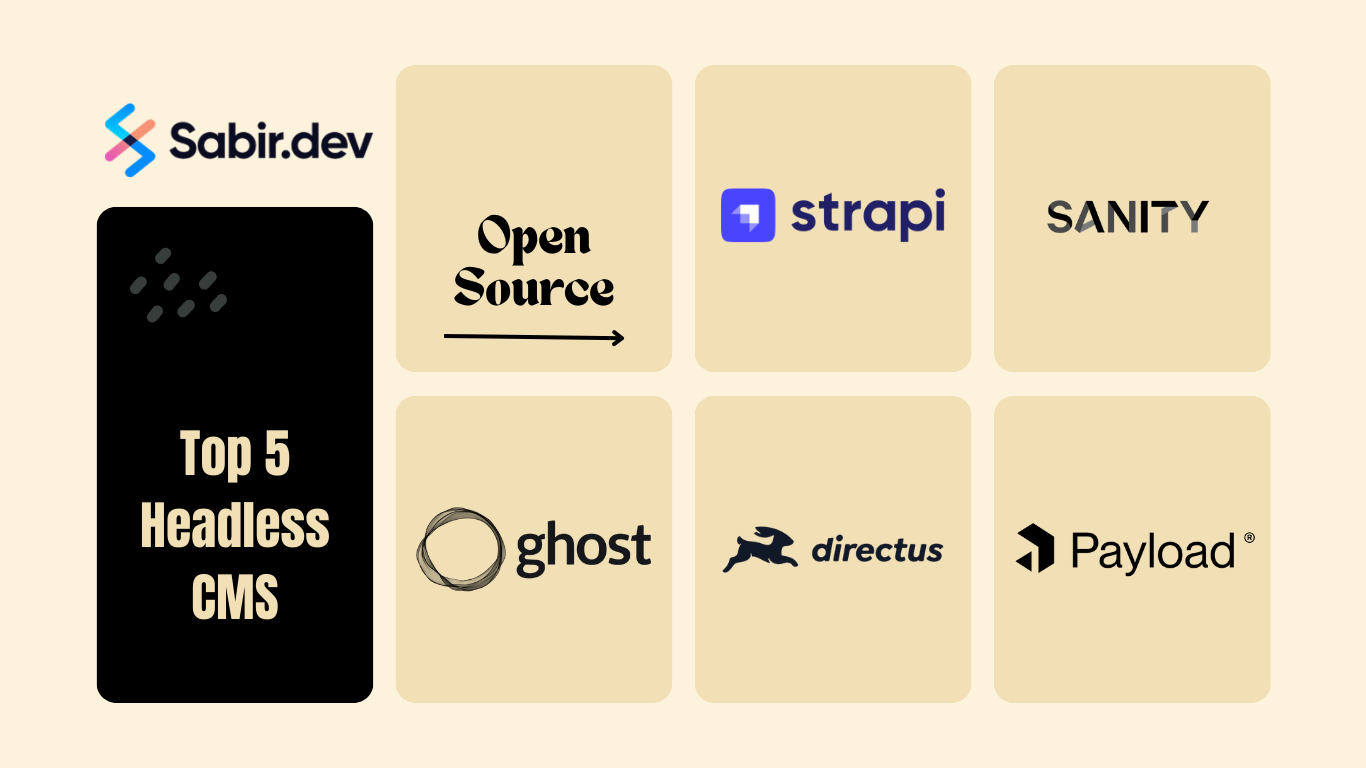TOP 5 Open-Source Headless CMS 2025
Discover the top 5 open-source headless CMS platforms for 2025, empowering software development agencies with flexibility and scalability. From Strapi’s customizable APIs to Sanity’s real-time editing, Ghost’s publishing prowess, Directus’ database integration, and Payload’s enterprise-ready features, these tools redefine content management. Start free and build innovative solutions today!

Sabir Hussain
April 9, 2025 • 2:14 pm
As we move into 2025, the demand for flexible, scalable, and developer-friendly content management systems (CMS) continues to grow, especially in the headless architecture space. Headless CMS separates the backend content repository from the frontend presentation, offering unparalleled flexibility through APIs. For small software development agencies and enterprises alike, open-source headless CMS platforms provide cost-effective, customizable solutions. Based on current trends and community adoption, here are the top five open-source headless CMS platforms for 2025, ranked according to user preference and practical utility.
1. Strapi
Website: https://strapi.io/
- Key Features: Strapi is a JavaScript/TypeScript-based CMS with a customizable admin panel, support for REST and GraphQL APIs, and an extensive plugin ecosystem. It offers robust security features (CSRF, CORS, XSS protection), multi-language support, and scalability for websites, mobile apps, and e-commerce. Its active community and over 60k GitHub stars highlight its reliability.
- Ideal For: Software development agencies needing a versatile backend with rapid development capabilities and strong community support for diverse projects.
- Pricing: Free community edition with unlimited usage; premium plans start at $9/month for additional features like team collaboration and advanced support.
2. Sanity
Website: https://www.sanity.io/
- Key Features: Built with React, Sanity provides real-time collaboration, a structured data approach, and a customizable editor. It supports GraphQL, integrates with Jamstack and static site generators, and offers a hosted content database with powerful API access. Its real-time editing and asset management stand out.
- Ideal For: Teams requiring dynamic content workflows, real-time editing, and integration with modern frontend frameworks like Gatsby or Next.js.
- Pricing: Free tier includes a hosted database and limited users; paid plans start at $99/month for teams, with self-hosting options available.
3. Ghost CMS
Website: https://ghost.org/
- Key Features: Ghost is a Node.js-based CMS optimized for publishing, featuring a sleek interface, powerful API, and built-in email marketing tools. Its MIT-licensed open-source code supports headless use, with integrations like Zapier and a focus on blogging and newsletters. It’s lightweight yet feature-rich.
- Ideal For: Agencies focused on content-driven sites, professional blogs, and newsletter platforms seeking an efficient publishing solution.
- Pricing: Free for self-hosted open-source version; Ghost(Pro) managed service starts at $11/month, with additional features like hosting and support.
4. Directus
Website: https://directus.io/
- Key Features: Directus transforms SQL databases into a headless CMS with a no-code admin interface, supporting REST and GraphQL APIs. Compatible with databases like MySQL, PostgreSQL, and SQLite, it excels in data management, user permissions, and digital asset handling.
- Ideal For: Agencies with existing databases or those needing a lightweight, customizable data platform for CRMs, e-commerce, or custom applications.
- Pricing: Completely free and open-source with self-hosting; optional cloud hosting plans start at $25/month for enterprise features.
5. Payload
Website: https://payloadcms.com/
- Key Features: Built with TypeScript, React, and Next.js, Payload offers a fully customizable admin UI, GraphQL/REST APIs, and an application framework. It supports complex content models, digital asset management, and enterprise use cases, with adoption by companies like Microsoft.
- Ideal For: Agencies requiring a highly customizable, all-in-one solution for advanced projects like e-commerce or enterprise applications.
- Pricing: Free for self-hosted open-source version; no official paid plans, but support or hosting may require custom arrangements.
Why Choose Open-Source Headless CMS in 2025?
The shift toward headless architectures in 2025 reflects the need for omnichannel content delivery and developer control. These top five platforms offer the freedom to tailor solutions to specific needs, backed by active communities and no licensing fees for core usage. Whether you prioritize customization (Strapi, Payload), real-time collaboration (Sanity), publishing efficiency (Ghost), or database integration (Directus), there’s an option for every project.